- Home
- Michael Wallace
Crow Hollow Page 12
Crow Hollow Read online
Page 12
“It was a great controversy. The Puritans at home had also banned the theater during Cromwell’s reign, and there were plenty in Oxford still who saw Shakespeare as unseemly and vulgar, at the very least.”
“Shakespeare’s language is not always temperate,” she conceded, though she couldn’t see any harm in reading the stories. It was no worse than reading Dante or Petrarch, and certainly better than Chaucer.
“When the Puritans were burning the folios,” he continued, “some rare earlier quartos had found their way to Holland. Sir Benjamin hired me to travel to Amsterdam to acquire one of them and carry it secretly to his library in All Souls College, Oxford. Later, I took trips to Paris and Rome, even Constantinople, to deliver and secure rare manuscripts. Not only for Sir Benjamin, but for Lord North as well. Once, I met King Charles himself as I passed him some bundle of papers or other. When I asked Sir Benjamin about it later—this was as he was leaving for Boston, which I didn’t yet understand—he told me the truth.”
“And what was that?”
“That I’d been in the service of the king for some time now. Most of those missions had been to pass secret missives to spies and diplomats, not to transfer manuscripts at all. So I was already fully implicated.”
“You still had a choice in the matter. There is always a choice.”
“Of course, but why would I have chosen otherwise? I was offered the chance to travel throughout Europe, paid a handsome sum for my services, given every opportunity to advance with loyal service.”
“But your father fought for the other side.”
His voice hardened. “He was a traitor and a fool.”
“Is that why you want the position as the king’s chancellor?”
“I don’t follow.”
“To show the world that you’re the king’s man. Surely, people whisper about you, gossip. Speculate about your loyalties and call you a Roundhead behind your back. But if you’re the chancellor of spies, one of the king’s most trusted men, then maybe they’ll stop.”
James looked thoughtful at this. “I had never considered that. I’m an ambitious man, and His Majesty rewards loyal ambition. That’s why I’m reaching for the position of chancellor. Not because of my father. I don’t think, anyway.”
“It doesn’t have to be one reason or the other,” Prudence said. “Add two weights instead of one if you want to tip the scales.”
“I later worked for two years in France,” he continued, “fighting against those treacherous snakes. It was exciting and dangerous. But we had plenty of silver and to spare, every food and pleasure at our hands.”
“This explains why you’re so free with your money.” And women, she thought. He was handsome, and the French women notorious. What temptations he must have faced.
“In France, this would have been considered frugality,” he said. “I once spent one hundred fifty pounds in six days in Paris.”
She didn’t know what to say to this. That staggering sum could buy a house in Boston.
“Pardon,” he said. “That sounds like a boast. I don’t mean it that way. But His Majesty has more money than he has loyal men. Sometimes with the former he seeks to buy the latter.”
“I see. And did he buy yours?”
“No. I serve out of duty.”
“To what?”
“To king and country.” He sounded surprised by the question. “Even you should understand that.”
“I understand loyalty.” It was hard for Prudence to articulate, even to herself, why James’s answer was disappointing. “We’re English too, you know.”
Another couple came into the room for supper, and Prudence and James fell silent as the others sized them up. The woman was young, maybe twenty, and looked vaguely familiar, but Prudence couldn’t place how or where.
A few minutes later, James yawned and stretched his legs. He twisted his neck, which popped. He gestured at the inn girl, who was feeding wood into the fire, and made a little gesture as if using a bed warmer, then pointed to the stairs. She nodded and filled the pan with coals, then went upstairs.
“Are you going to bed already?” Prudence asked.
“I’m exhausted. Aren’t you?”
“A little. But I think I’ll sit up for a bit. That wine went to my head.”
“You barely had any. But very well. I’ll leave you some space in the bed.”
“Thank you.” The other couple was watching, the man smoking a long pipe, so Prudence added, “Good night, dear.”
James winked at her. When the girl came back down, he disappeared up the stairs. The floor overhead creaked for a few minutes, then was still. Prudence would wait an hour or so to make sure he was asleep before going up. She had brought her pen, ink, and paper with her, and she spent a few minutes writing what had come to pass since she’d left poor Old John Porter at the woodshed.
“Goodwife Cotton?” the young woman said from the other table.
Prudence turned, startled. She only just kept her wits. “It’s Goodwife Smith now.”
“Oh, yes. Of course. I hadn’t realized you’d remarried. My sister didn’t say anything about it.”
“I only married recently. Pray, pardon me, Goodwife—”
“It’s me, Hannah Platt. I’m Goody Stevenson now.”
“Of course, I’m so sorry. Hannah! Rebecca’s sister. You’re so grown up. Goodness, are you expecting?”
Hannah’s hands had been resting on her belly, and now she smiled at her husband, who gave a contented nod between puffs. He was a handsome fellow with a prosperous look about him, maybe in his midtwenties, though Hannah couldn’t be older than nineteen.
“I’m sorry I didn’t recognize you early enough to meet your husband,” Hannah said. “What are you doing in Marlborough?”
“We’re moving back to Winton.”
“Of course. That’s right. I’ve read your narrative. It was so enthralling.”
Prudence was squirming. Suddenly, going upstairs while James was awake didn’t seem so risky. She forced herself to remain calm.
“Why are you on the road?” she asked.
“We were visiting my grannie in Springfield,” Hannah said. “She’s not well. We’re on our way back to Boston, though. Wait until I tell Rebecca I saw you. I can’t believe she didn’t tell me you’d remarried.” Hannah smiled. “I’m giving her a good scolding.”
“I don’t think she knows. I’ve been keeping my own company—too much notoriety after my account was published. It’s not good for one’s vanity.” Prudence yawned, then rose to her feet. “Pray, pardon me, but it was a long day and I promised my husband I’d retire early.”
A flicker of disappointment washed over Hannah’s face. “Yes, of course. I’m sorry.”
Prudence touched the young woman’s hand. “I’ll look for you and Rebecca next time I’m in Boston. It has been too long since we’ve talked.”
The young woman looked happier at this.
“Goodnight, Hannah. And you, Goodman Stevenson. May God be with you both.”
Prudence braved the frigid outhouse out back instead of using the chamber pot upstairs. When she reached the room, she eased the door open as carefully as possible and slipped inside. With any luck, he’d be asleep already.
“That was quicker than I was expecting,” his voice said from the bed. “I thought you’d be down there half the night.”
She shut the door and latched it. “I was recognized.”
He shifted abruptly in the darkness, as if sitting up. “Really? What happened?” He started moving around.
“No, it’s all right. Lie down. Pray face the wall while I change clothing.”
She undressed quickly in the dark, then groped for the clothing they’d salvaged from the burned farmhouse. She pulled on a nightgown and nightcap and changed her socks for dry ones while telling him about her encounter with Hannah.
“Not good,” he said when she finished.
“It all depends on how quickly Hannah sees Rebecca. Her si
ster is something of a gossip—once she knows, the news will cross Boston in a few hours. Then it will get to Reverend Stone and he’ll know how to find us.”
“We’ll be far ahead by then, probably in Indian country already. I’m more worried about those riders catching us in an ambush.”
“You fought them off once. Would they really try again?”
James lay back down. “They were careless that time. They didn’t expect what we gave them.”
No, they wouldn’t have expected it. The way James had thrown himself into violence, shooting and hacking, would have taken anyone aback. Three of their number dead. They would remember that next time.
You killed one of those men yourself. They weren’t expecting that, either.
“They have to know we’re on our way to Winton,” James said. “If they catch me alone, I’m a dead man.”
“You’re not alone.” She shifted on her feet. The cold of the floorboards seeped up through her socks.
“I appreciate that, but they’ll be ready for you next time too. I need to reach Springfield. I’ll have help then.”
“What kind of help?”
He shifted in the bed. “Are you climbing in where it’s warm or standing there all night?”
“Is standing here all night a possibility?”
“Come on, I’m all the way over by the wall. I won’t touch you.”
At last she ventured over and pulled back the covers. There she stood for a long moment until he grumbled that he was getting cold. Finally, she climbed in quickly and pulled the covers up. She felt his body next to hers, but thankfully, his back was turned.
“You can trust me,” he said. “I am capable of mastering my urges.”
“Let’s not talk about your urges.”
“This might surprise you,” he said, “but women have urges too. They’re not all as cold as Newfoundland.”
“I know that.” Prudence felt prickly at this. “I’m a human of flesh and blood. I have desires too.”
“You do?” He sounded shocked.
“I was married nigh three years, Master Bailey. I am a woman of flesh and blood.”
“So now it’s Master Bailey, is it? Generally, women get more familiar when they climb into my bed, not less.”
“I shall pretend I don’t know what that implies.”
He chuckled. “A jest, that’s all.”
“Of course,” she said, drily. “I understand both lovemaking and jests. You think girls—even unmarried girls—don’t talk about men?”
“I hadn’t thought about it much, to be honest. But yes, I can imagine that easily enough.”
“You should see the way the Branch girls coo over handsome men. I heard them talking about you, in fact.”
“Really?” He rolled over to face her. “Tell me more.”
“Lucy thought you’d make a fine husband. It’s a good thing you left when you did or she might have come to your bed the first time Peter was out.”
“Who said she didn’t?” This time he didn’t sound like he was joking.
“What?” She shot out of bed. “You didn’t!”
“No, I didn’t. I could have, though. She made her interest clear enough. And I’m plenty man enough that I wanted to, that’s for sure.”
Prudence climbed back into bed. “You can turn back to the wall again.”
He obeyed with a sigh. “There is nothing about this situation that suggests that a good night of sleep is in store.”
No, there wasn’t. All this talk had left her flushed, and a new worry niggled at her. Supposing James didn’t behave himself. Could she guarantee that her own response would be virtuous?
CHAPTER FIFTEEN
They were back on the road the next morning after a quick breakfast of cold bread, milk, and hard cheese. Prudence ached all over, and she was exhausted from a poor night of sleep. The inn had been cold and the bed hard.
To keep up their story, they rode two horses out of town and led the rest. The inn’s stable boy had cared for the animals well, and they weren’t as surly to be on the road as Prudence had expected. They made good time for the first two hours.
The day wasn’t as frigid as the past two, but the easing temperatures were accompanied by snow. At first it fell as light and fine as flour through a sifter, but gradually the sky turned from a slate gray to the shade of twilight, though it was midday. Soon, the snow fell in fat, lazy flakes, gradually growing in intensity.
James had been riding in silence, his brow furrowed and his gaze distant, but now he looked skyward. “Was that thunder?”
“Aye, thunder snow.”
“I’ve never heard of such a thing.”
“They say that when there is thunder during a snowstorm, someone important has died.”
His face darkened and he drew his lips into a narrow, hard line.
Prudence studied him, worried. “What troubles you?”
“I have been thinking about Peter Church. He may not count as important in the celestial mathematics of such things, but he was important to me. I will bring the king’s justice upon those villains, Prudence, as God is my witness.”
She knew what it was like to fall into dark, brooding memories, so to distract him she asked him about France, and he was soon telling her about Versailles, where the Sun King was building a palace of such magnificent size and opulence that she could scarcely imagine it. The grounds alone were the size of Boston, he claimed. He seemed to cheer in the telling.
Within an hour, a good two inches had fallen, and every stone wall, house, and barn carried a fresh white cap. Where the ground was flat they found it difficult to pick out the road from the surrounding fields.
About an hour later, they passed a horse-drawn sled carrying hogsheads of grain. The driver hailed them, demanded where they were going and from where they’d come, then asked for word from Boston. The news about the French off Nantucket agitated him greatly. He was still rumbling something about a war with the French in Quebec when they finally pulled out of earshot.
“Haven’t we had enough war?” she asked James.
“You’ll never get rid of it. War is the natural condition of man.”
“It shouldn’t be. Not here, anyway. New England is consecrated for the Lord.”
“Don’t deceive yourself. The devil is about his mischief here, just as he is anywhere.”
“But he shouldn’t be,” she insisted, more out of stubbornness than because she was convinced he was wrong. “He should have no place here. When every Godly soul bends his knee, Satan shall be dead in this land.”
“Dead?” James said. “What a shame to leave so many fatherless children in Boston.”
Prudence turned away with a snort and urged the horse ahead. But she couldn’t get the image of the devil’s fatherless children out of her mind, and an inadvertent laugh burst from her mouth. James came up beside her, grinning mischievously.
They’d hoped to make it to Springfield by nightfall, but they were still twenty miles outside the town and struggling through a foot of snow when James called a surrender and they started looking for lodging. The storm was easing, but in its wake came a biting wind that drove snow across the road. It stung at Prudence’s face and dug deep into her lungs.
They passed through a sleepy hamlet locked in by snow. There was no inn. James stopped his horse and eyed the houses.
“Don’t you think we’re better off trying one of the farmhouses outside of the village?” she asked. “Less gossip to pass around.”
“Probably, yes. I was just looking. It’s so beautiful.”
Was it? It wasn’t much different from fifty other New England villages, except that it did look white and clean with all the snow and icicles. The village meetinghouse boasted a steeple that was too tall to merely serve as a bell tower and seemed almost vain, except she did admit it looked striking against the snow-covered pine hills behind the town.
“’Twould be even more handsome with candles in the windows and Advent wreaths
above the lintels,” James said. “It’s December nineteenth already. Why aren’t they decorated for Christmas?”
“We don’t celebrate Christmas,” she said. “That’s a Papist, pagan celebration.”
“Nonsense.”
“They still celebrate it in England?”
“We do have dissenting sects who eschew the holiday, but it’s hard to imagine a whole country of Christians casting it aside. I suppose you don’t have plum puddings, yule logs, fruitcakes, or gift giving, either.”
“No, those are all pagan rituals.”
“Drains the pleasure from life, that’s what it does.”
He seemed more disgusted by this than anything he’d seen so far in New England, and as they rode out of town she felt a twinge of shame. Her husband had often raised an eyebrow at the quirks of local customs, but somehow he’d never made her feel embarrassed about her home.
James began searching for a farmhouse to beg lodging as soon as they got out of the village, but they’d entered another stretch of ruined homes from the war. It was growing dark, the horses were shivering, and Prudence was about to suggest they turn around, when a light flickered from behind windows ahead of them just before the road plunged back into the forest.
It took some pounding to bring the startled owners of the house to the door. James exchanged introductions with the couple, who were named Meyer, then asked about spending the night. While he spoke, Prudence looked over his shoulder into the front room and was dismayed by what she saw. The simple, two-room house held half a dozen young children already, plus the couple. The place was tidy but hardly prosperous.
Goodwife Meyer was a stout, kindly faced woman with ruddy cheeks, who seemed more intrigued by the unexpected visitors than suspicious. But when James asked about a bed, she cast a doubtful glance at her already-crowded living quarters.
James got out his purse. “I’ll pay you, of course. Six shillings for a bed and supper, plus stabling the horses in your barn. Is that sufficient?”
That was overly generous, and the woman’s eyes widened as she glanced quickly at her husband.
“We could put the boys in the barn,” Goodman Meyer said quickly.

 Crowlord (The Sword Saint Series Book 2)
Crowlord (The Sword Saint Series Book 2) Crowlord
Crowlord The Red Sword- The Complete Trilogy
The Red Sword- The Complete Trilogy Wandering Star (The Quintana Trilogy Book 1)
Wandering Star (The Quintana Trilogy Book 1) Bladedancer
Bladedancer Sword Saint
Sword Saint The Alliance Trilogy
The Alliance Trilogy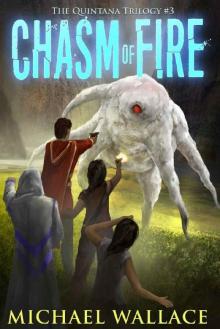 Chasm of Fire
Chasm of Fire Bladedancer (The Sword Saint Series Book 4)
Bladedancer (The Sword Saint Series Book 4) The Devil's Deep
The Devil's Deep Shadow Walker (The Sword Saint Series Book 3)
Shadow Walker (The Sword Saint Series Book 3) Starship Blackbeard
Starship Blackbeard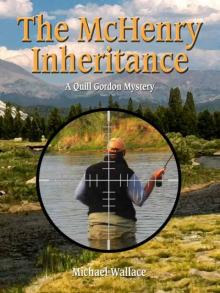 The McHenry Inheritance (Quill Gordon Mystery Book 1)
The McHenry Inheritance (Quill Gordon Mystery Book 1) Sun King (The Void Queen Trilogy Book 3)
Sun King (The Void Queen Trilogy Book 3)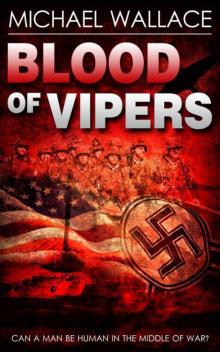 Blood of Vipers
Blood of Vipers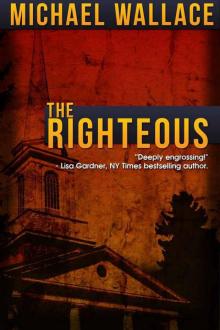 Righteous - 01 - The Righteous
Righteous - 01 - The Righteous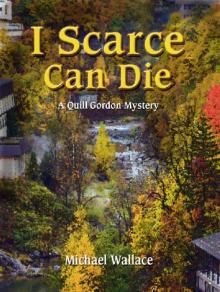 I Scarce Can Die (Quill Gordon Mystery Book 5)
I Scarce Can Die (Quill Gordon Mystery Book 5) The Devil's Cauldron
The Devil's Cauldron The Wicked (The Righteous)
The Wicked (The Righteous)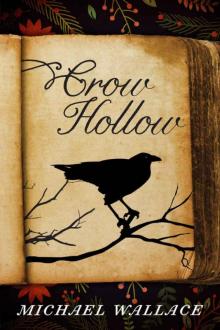 Crow Hollow
Crow Hollow Righteous03 - The Wicked
Righteous03 - The Wicked Righteous02 - Mighty and Strong
Righteous02 - Mighty and Strong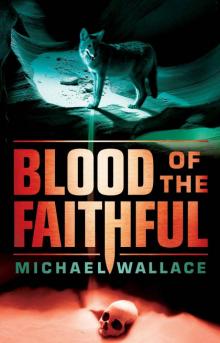 Blood of the Faithful
Blood of the Faithful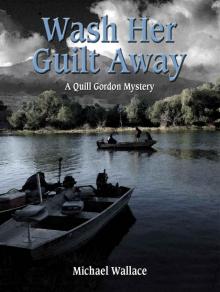 Wash Her Guilt Away (Quill Gordon Mystery Book 2)
Wash Her Guilt Away (Quill Gordon Mystery Book 2) The Kingdom of the Bears
The Kingdom of the Bears The Emerald Crown (The Red Sword Trilogy Book 3)
The Emerald Crown (The Red Sword Trilogy Book 3) The Dark Citadel
The Dark Citadel The Warrior King (Book 4)
The Warrior King (Book 4) Rebellion of Stars (Starship Blackbeard Book 4)
Rebellion of Stars (Starship Blackbeard Book 4)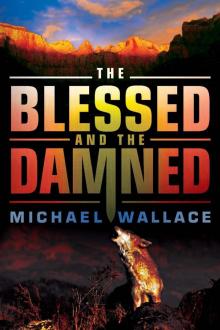 Righteous04 - The Blessed and the Damned
Righteous04 - The Blessed and the Damned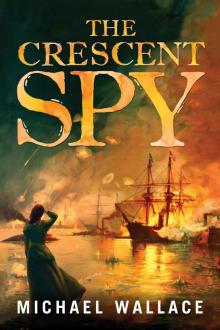 The Crescent Spy
The Crescent Spy Queen of the Void (The Void Queen Trilogy Book 1)
Queen of the Void (The Void Queen Trilogy Book 1) The Red Sword (The Red Sword Trilogy Book 1)
The Red Sword (The Red Sword Trilogy Book 1) The Sentinel (The Sentinel Trilogy Book 1)
The Sentinel (The Sentinel Trilogy Book 1)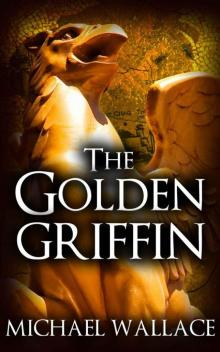 The Golden Griffin (Book 3)
The Golden Griffin (Book 3)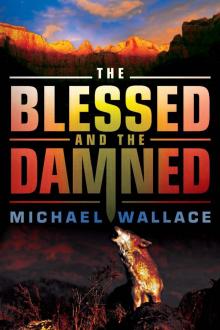 The Blessed and the Damned (Righteous Series #4)
The Blessed and the Damned (Righteous Series #4) Hell's Fortress
Hell's Fortress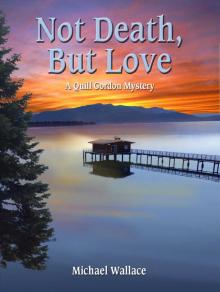 Not Death, But Love (Quill Gordon Mystery Book 3)
Not Death, But Love (Quill Gordon Mystery Book 3) Destroying Angel
Destroying Angel The Free Kingdoms (Book 2)
The Free Kingdoms (Book 2) Dragon Quadrant (The Sentinel Trilogy Book 2)
Dragon Quadrant (The Sentinel Trilogy Book 2) Shattered Sun (The Sentinel Trilogy Book 3)
Shattered Sun (The Sentinel Trilogy Book 3)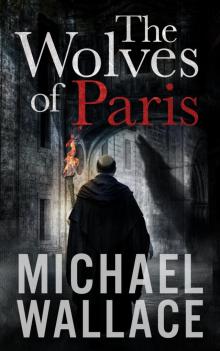 The Wolves of Paris
The Wolves of Paris Lords of Space (Starship Blackbeard Book 2)
Lords of Space (Starship Blackbeard Book 2) Dreadnought (Starship Blackbeard Book 3)
Dreadnought (Starship Blackbeard Book 3) The Village of Dead Souls: A Zombie Novel
The Village of Dead Souls: A Zombie Novel The Black Shield (The Red Sword Book 2)
The Black Shield (The Red Sword Book 2) The Daughters Of Alta Mira (Quill Gordon Mystery Book 4)
The Daughters Of Alta Mira (Quill Gordon Mystery Book 4) Mighty and Strong (The Righteous)
Mighty and Strong (The Righteous)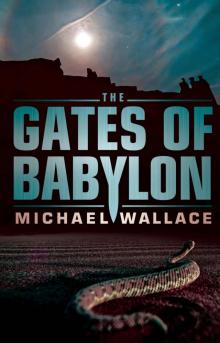 The Gates of Babylon
The Gates of Babylon